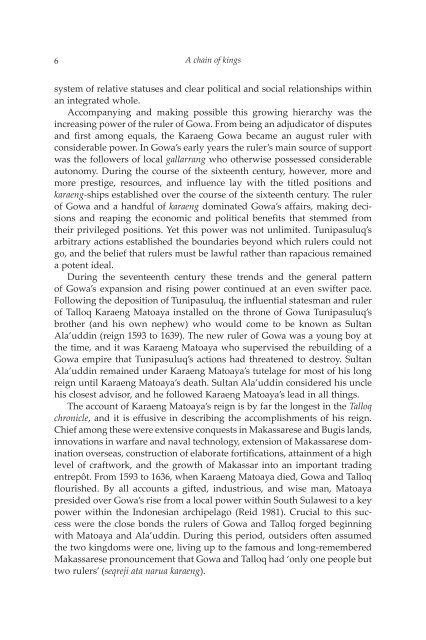A CHAIN OF KINGS - Books and Journals
A CHAIN OF KINGS - Books and Journals
A CHAIN OF KINGS - Books and Journals
You also want an ePaper? Increase the reach of your titles
YUMPU automatically turns print PDFs into web optimized ePapers that Google loves.
6<br />
A chain of kings<br />
system of relative statuses <strong>and</strong> clear political <strong>and</strong> social relationships within<br />
an integrated whole.<br />
Accompanying <strong>and</strong> making possible this growing hierarchy was the<br />
increasing power of the ruler of Gowa. From being an adjudicator of disputes<br />
<strong>and</strong> first among equals, the Karaeng Gowa became an august ruler with<br />
considerable power. In Gowa’s early years the ruler’s main source of support<br />
was the followers of local gallarrang who otherwise possessed considerable<br />
autonomy. During the course of the sixteenth century, however, more <strong>and</strong><br />
more prestige, resources, <strong>and</strong> influence lay with the titled positions <strong>and</strong><br />
karaeng-ships established over the course of the sixteenth century. The ruler<br />
of Gowa <strong>and</strong> a h<strong>and</strong>ful of karaeng dominated Gowa’s affairs, making decisions<br />
<strong>and</strong> reaping the economic <strong>and</strong> political benefits that stemmed from<br />
their privileged positions. Yet this power was not unlimited. Tunipasuluq’s<br />
arbitrary actions established the boundaries beyond which rulers could not<br />
go, <strong>and</strong> the belief that rulers must be lawful rather than rapacious remained<br />
a potent ideal.<br />
During the seventeenth century these trends <strong>and</strong> the general pattern<br />
of Gowa’s expansion <strong>and</strong> rising power continued at an even swifter pace.<br />
Following the deposition of Tunipasuluq, the influential statesman <strong>and</strong> ruler<br />
of Talloq Karaeng Matoaya installed on the throne of Gowa Tunipasuluq’s<br />
brother (<strong>and</strong> his own nephew) who would come to be known as Sultan<br />
Ala’uddin (reign 1593 to 1639). The new ruler of Gowa was a young boy at<br />
the time, <strong>and</strong> it was Karaeng Matoaya who supervised the rebuilding of a<br />
Gowa empire that Tunipasuluq’s actions had threatened to destroy. Sultan<br />
Ala’uddin remained under Karaeng Matoaya’s tutelage for most of his long<br />
reign until Karaeng Matoaya’s death. Sultan Ala’uddin considered his uncle<br />
his closest advisor, <strong>and</strong> he followed Karaeng Matoaya’s lead in all things.<br />
The account of Karaeng Matoaya’s reign is by far the longest in the Talloq<br />
chronicle, <strong>and</strong> it is effusive in describing the accomplishments of his reign.<br />
Chief among these were extensive conquests in Makassarese <strong>and</strong> Bugis l<strong>and</strong>s,<br />
innovations in warfare <strong>and</strong> naval technology, extension of Makassarese domination<br />
overseas, construction of elaborate fortifications, attainment of a high<br />
level of craftwork, <strong>and</strong> the growth of Makassar into an important trading<br />
entrepôt. From 1593 to 1636, when Karaeng Matoaya died, Gowa <strong>and</strong> Talloq<br />
flourished. By all accounts a gifted, industrious, <strong>and</strong> wise man, Matoaya<br />
presided over Gowa’s rise from a local power within South Sulawesi to a key<br />
power within the Indonesian archipelago (Reid 1981). Crucial to this success<br />
were the close bonds the rulers of Gowa <strong>and</strong> Talloq forged beginning<br />
with Matoaya <strong>and</strong> Ala’uddin. During this period, outsiders often assumed<br />
the two kingdoms were one, living up to the famous <strong>and</strong> long-remembered<br />
Makassarese pronouncement that Gowa <strong>and</strong> Talloq had ‘only one people but<br />
two rulers’ (seqreji ata narua karaeng).









![Am HaSefer [Volk des Buches] - Books and Journals](https://img.yumpu.com/20648352/1/174x260/am-hasefer-volk-des-buches-books-and-journals.jpg?quality=85)







